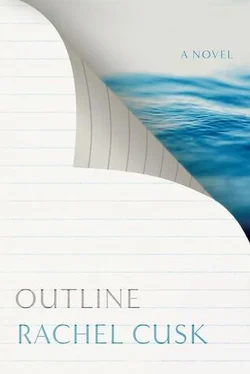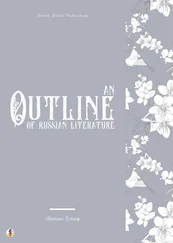‘I myself was in the kitchen,’ she said, ‘squeezing oranges. I had just made myself the most delicious breakfast, with the ripest little melon I had found in the market and a slice of fresh cheese I bought from a woman who keeps beautiful goats on a hillside near Delphi, when I heard the sound of him singing. I knew immediately what it meant. The idiot, I thought — why does he have to holler it out so that I can hear it all the way in the kitchen? I, the only one who knows what could have caused that soap opera of betrayal to pop into his head, taking for himself the best part, just as he would always take the best part of whatever was on my plate, simply reach across and take whatever he liked the look of, even though I had saved it until last. Why couldn’t he have kept his mouth shut? And all before I had had the chance to eat my beautiful breakfast, which now he would find waiting for him untouched on the counter when he came out of the shower: his happiness, I knew, would be complete.’
She paused to tuck a strand of hair, which was dyed a bright yellow blonde, behind her ear, and moistened her lips again before she resumed. ‘This morning,’ she said, ‘I had arranged to call in at his office on my way here, to discuss financial matters, about which in any case we always agree. My husband’s lack of consideration is matched by his complete lack of spite. He is a man,’ she sighed, ‘of very good taste, which for me has always been a form of torture, because I am a good student and have been unable to prevent myself from learning his taste very thoroughly, to the extent that I have come to know what he wants before he even wants it himself, and in the matter of women I have become positively prophetic, almost to the extent that I see them with his eyes and feel his own desire for them. So I learned in the end to close my eyes; and if only I had remembered to close my ears too, that morning in the kitchen, I might still be looking down at my plate to find that the nicest and most delicious morsel had somehow vanished.
‘Today, when I took the glass lift up to his office, which is on the thirteenth floor, I emerged to see that everything there had changed. A complete redecoration had occurred: the new theme was white, and being a man of extremes my husband had evidently decided that everything not white — including some of the people — had to be removed. And so Martha, my dear friend, his secretary, was no longer to be found in her place by the big window, at her old desk where she kept her packed lunch and her photographs of her children and a pair of flat shoes for walking, where we used to sit and talk and she would tell me all the things I needed to know and none of the things I didn’t — Martha was gone, though my husband assured me that she had not been actually eradicated, merely given a big office of her own at the back, where she wouldn’t be seen by visitors. In her place by the window, in the all-white world that reminded me of nothing so much as that morning in the kitchen and the slice of fresh white goat’s cheese I had to leave behind forever on its plate, sat a new girl. She, of course, wore white, and had skin pale as an albino’s; and her hair, too, was entirely white, except for one long strand which came out like a plume from her head and was dyed — the only piece of colour in the place — the brightest blue. In the lift on the way down I marvelled at the sheer genius of the man, who had also managed, while I was there, to exact my forgiveness as stealthily as a pickpocket removes your wallet, and was returning me to the street lighter, though poorer, with that quill of blue perched in my thoughts like a feather in a beggar’s cap.’
Marielle fell silent, her ridged face lifted, her enormous glittering eyes gazing straight ahead. It was quite common, the man to her left presently observed, for young people now to use their appearance as a means of shocking or disturbing others: he himself — and he was sure the same was true for all of us — had seen hairstyles far more extreme than the one Marielle described, not to mention tattoos and piercings of sometimes an apparently violent nature, which all the same said nothing whatever about their owners, who were often people of the greatest sweetness and docility. It had taken him a long time to accept this fact, for he was predisposed to be judgemental and to find the meaning of a thing commensurate with its appearance, and also to be frightened of what he didn’t understand; and though he didn’t, strictly speaking, comprehend the reasons why people might choose to mutilate themselves, he had learned not to read too much into it. If anything, he saw such outward extremes as the symbols of a correspondingly great inner emptiness, a futility that he believed came from the lack of engagement with any meaningful system of belief. His peers — and he was only twenty-four, though he was aware he looked somewhat older — were for the most part quite astonishingly indifferent to the religious and political debates of our times. But for him, political awakening had been the awakening of his whole sensibility, had given him a way of existing in the world, something about which he felt pride but also a certain anxiety, almost a kind of guilt, which he found difficult to explain.
This morning, for instance, on his way here he had walked through the part of the city where last summer — as everyone would recall — there were demonstrations, in which he and his political friends had proudly participated. He found himself following the exact route they had followed that day, treading streets he had not visited again until now, and found himself filled with emotion at the memories they brought back to him. Then, at a certain point, he passed through an alleyway on both sides of which the buildings were burnt-out shells: he could see through the glassless windows into the cavernous, ruined interiors, all blackened and ghostly and still filled with the mess and detritus of their own destruction, for in the whole year that had passed no one had come to clear it away. Quite how these buildings had been set alight he did not recall, but it had been towards evening, and the fires had been seen from all over Athens. News agencies had broadcast footage of the smoke billowing across the city that had been relayed all over the world; it was, he could not deny, part of the excitement of that night, as well as a necessary means — he believed — of getting the demonstrators’ message across. Yet all he could feel, looking through into the desolate ruins, was shame, to the extent that he actually thought he heard his mother’s voice, asking him whether it was really he that was responsible for all that mess, because people had told her so and until he confirmed it she wouldn’t know whether or not to believe them.
As a child, he continued — his name, according to my drawing, was Christos — he had been extremely shy and awkward, to the point where his mother had decided to enrol him in dancing classes as a way of building his confidence. These classes, which took place in a nearby hall and were attended by local girls and a smaller number of local boys — barbarians all — were a torment to him on a scale that even now is difficult for him to convey. It was not only that he was overweight and physically unconfident: it was that he had a fear of exposure that drove him inexplicably, in such situations, to make himself fall over. It was a kind of vertigo, he said, such as drives people who are frightened of heights to want to jump; he simply couldn’t bear being looked at, and to ask him to dance was like asking him to walk a high wire, where the thought of falling must be so ever-present that it would eventually bring itself about. And fall he did, repeatedly and with anguish, flailing humiliated among the twirling feet of the other children like a beached whale, and consequently subject to much mockery, until the dancing teacher was forced to suggest that he stop attending classes and he was allowed to stay at home.
Читать дальше












